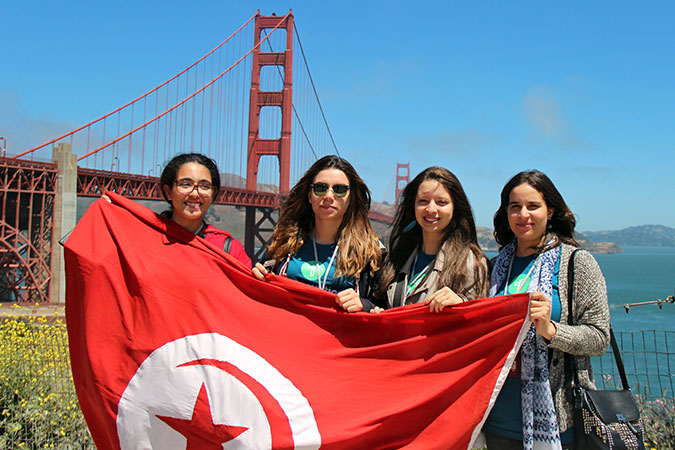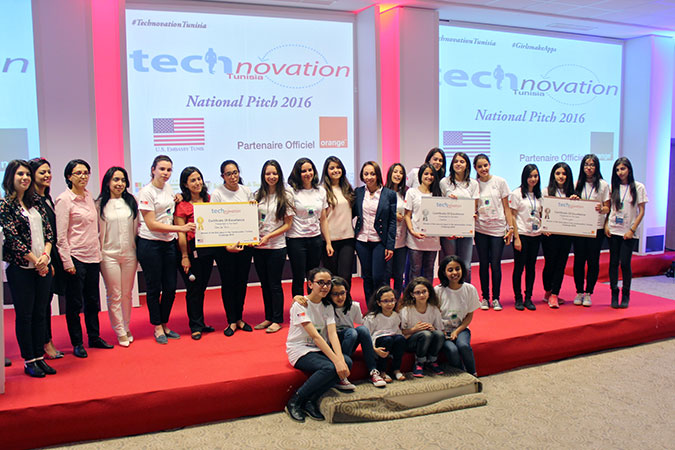Leveraging the Technovation Challenge, Tunisian girls start coding
Date:
Girls across Tunisia are getting ready for the third edition of the Technovation Challenge, a global initiative that invites girls aged 10 – 18 years to learn and apply technology to solve problems within their communities. Working in teams, girls build mobile applications and use business planning to launch these apps, supported by mentors. Some 70 teams and more than 300 applicants have registered for the 2017 national pitch in Tunisia, and finalists would be announced in May 2017.

Sara Ghodbane, 16 years old, is among this year’s participants, but she is not new to Technovation. “I was a little bit disappointed not to win the contest last year, but this did not prevent me from joining the journey again this year, because I learnt a lot from other women whom I consider as role models,” said Ghodbane. “This experience also enhanced my creativity, curiosity and my ability to solve problems,” she added.
This year, the teams competing in the Technovation Challenge are becoming familiar with the internationally agreed Sustainable Development Goals (SDGs), as their projects have to address at least one issue within the overall SDGs focus areas: poverty reduction, quality education, good health and well-being, climate action, peace and justice or gender equality. Sara Ghodbane’s team, for example, is working on the SDG on poverty elimination by developing an app, called TOTE, that uses gaming and a reward system to encourage users to donate clothes, toys and other goods to those in need via an association or a social enterprise.
The first Technovation Challenge was held in Tunisia in 2015 with the support of the US Embassy. “When I first started looking for Tunisian candidates for the first edition, people didn’t believe that young girls could develop tech pitches and apps. After a lot of effort, we registered 54 girls, who composed 15 teams, and only nine teams submitted their project pitches on time,” recalls Amel Ghouila, a Tunisian Bioinformatician who was instrumental in the effort to increase Tunisian girls’ participation in technology.
The initiative has grown in popularity since then. By 2016, the number of participants in Technovation had tripled—183 girls from all over Tunisia registered in the competition and 20 teams successfully submitted their ideas. UN Women joined the initiative and brought on board Orange Tunisia, a major telecom company, as a programme partner to provide technical support and mentorship to the participants.

For girls who participate in Technovation, it opens up new possibilities that they hadn’t even considered before. In July 2016, Leila Mnekbi, Mariem Turki, Olfa Jabnouni and Nesrine Maghdiche, members of the “Born to Tech” team, made history as the first girls to represent an Arab country at the Technovation World Pitch Summit. Their winning app, SKYLLS, linked university graduates with mentors to enhance their soft skills and increase their chances of finding jobs. In Tunisia, the unemployment rate among recent university graduates stands at a staggering high of 31 per cent, and lack of mentorship has often been cited as a key factor.
“We spent long nights identifying the scope of our project and trying to find solutions,” recalls Leila Mnekbi, who was only 17 years old when she took part in the competition. “Our efforts paid off when we were chosen to present the project at the Technovation World Pitch Summit in San Francisco. Meeting other girls who tech from different parts the world convinced me that we have to push forward and explore nontraditional fields of work, despite the resistance that we might face,” she added. Today, Mnekbi and her teammates are in their senior year of high school and working to improve their app. She wants to become an entrepreneur in the IT sector.
Hela Skhiri, Programme Coordinator of UN Women in Tunisia took part in the opening ceremony of this year’s challenge, and drew the participants’ attention to the issue of discrimination against women and girls in her message. “When we promote the interest and training of girls in coding, it helps in challenging social norms and stereotypes that traditionally keep girls and young women out of the emerging digital sector,” she said. “By encouraging them to explore and learn coding, we are enabling girls to address the needs of their communities and develop technology that enhance their daily lives.”
Leading up to the national pitch this year, the organizers have introduced regional preparatory workshops that provide mentoring and teach coding and business planning to the participants. The group of partners supporting the initiative is also growing, with UNICEF the initiative as well..
For latest information on Technovation Challenge Tunisia, visit http://www.technovationtunisia.com/